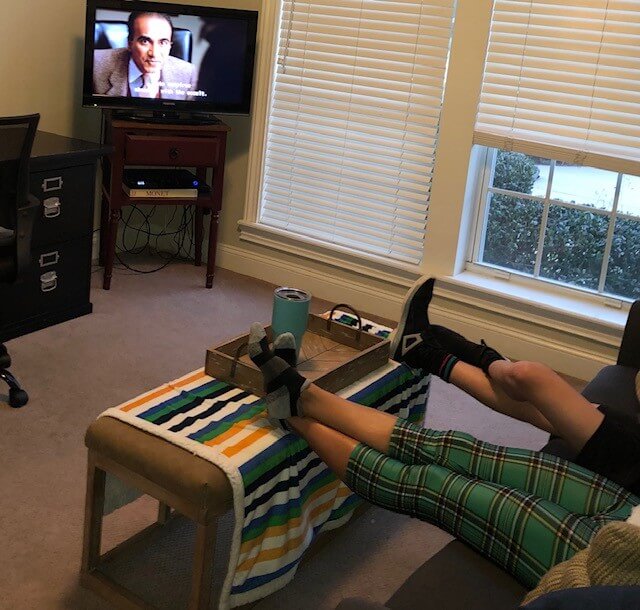
An activity that started as a way for me to spend time with my son became a valuable lesson on the care and appreciation of weight-diverse clients.
First, a little background. My son is entering high school next year. He is sweet, thoughtful and funny. He is also painfully aware that he is smaller than most boys his age, which limits his involvement in some sports and over time, has eroded his self-confidence. Music has been his lifeline, he started playing guitar about three years ago, and has since become an accomplished musician. When choosing his electives for his freshman year, though, he felt conflicted about signing up for Musical Theater. Obviously, he loved music, but he wasn’t sure if any of his friends were joining, or if, by joining, he would be perceived as ‘uncool’. I had no idea what Musical Theater was like at the high school or how it was perceived by other students. Although I don’t advocate that any of my kids try to be ‘cool’, I didn’t want him to have to navigate a new school with the added layer of being part of a group that potentially made him more self-conscious. We decided that since it would be difficult for him to get first-hand experience, we could give him a ‘virtual tour’ of being part of a performance group by watching the TV series Glee.

I was hooked on Glee as soon as it aired in 2009. Not only were the performances amazing, but I empathized with the perfectly imperfect characters as they grappled with the normal challenges of being a teenager, such as their sexuality and concerns about popularity. I also looked forward to seeing how the talented writers would handle deeper issues such as discrimination, teen pregnancy and gender identity. I loved that they used the technique of internal monologue (where the character voices his or her thoughts) so that we are privy to their unfiltered internal processes as they encounter and navigate these challenges, providing evidence that our inner journey is not always reflected in our outward appearance or actions.
Some characters, like some of my clients, consistently deal with other people’s aversion to anyone who looks different. One of the female leads, Mercedes, who is overweight, decides to join the cheerleading team. Not just any cheerleading team, but one that has won national championships. The training is rigorous and the cheerleaders are known for their perfect hair and bodies. It is led by an unabashedly rude, cynical and biased coach who holds weigh-ins and suggests drinks that cause gastric disturbances in order to lose weight. Mercedes soon becomes a target for her. She ridicules Mercedes for wearing pants instead of a skirt and Mercedes first defends herself, then falls prey to the seductive allure of being part of a popular group. She decides to try to quickly lose weight.
She diets until she faints, and still manages to gain two pounds (a very common effect of food deprivation). She feels physically and emotionally terrible. At the weigh-in, she is shamed. Then, an unlikely ally, the snobby and popular former head cheerleader, visits her in the nurse’s office and reveals that she too struggled with her weight and the desire to be popular. She was kicked off the squad once the coach discovered that she is pregnant and, to her surprise, found solace in the Glee club.
Once pregnant, she realized the importance of eating for nourishment, and she ate more food, but it was much healthier. Not only did she feel better, but she was proud of how she was caring for her baby. She told Mercedes that she regretted not giving her body the same care and attention that she now gives to her unborn baby. This resonated with Mercedes, and prompted her to sing a heartfelt rendition of Christina Aguilera’s Beautiful during a school pep rally as both a symbol of self-acceptance and a refusal to suffer in order to look a certain way.
“Owning our story and loving ourselves through that process is the bravest thing that we will ever do.”
Dr. Brene Brown
By re-watching Glee, I came to recognize the parallels between the characters and my clients who struggle with weight. Here are 5 ways that some of these ‘Glee Principles’ have the potential to translate into improved patient care:
- We all, no matter what age, struggle to find acceptable outlets for strong emotions and/or stress. Anger, pain and shame don’t go away just because we get older. They get stored in the body, causing anxiety or depression or they get expressed without control, maybe leading to aggression or self-harm. We can make a choice to numb ourselves by using the usual, destructive coping mechanisms (smoking, drugs and alcohol) or we can find an appropriate outlet for them by incorporating empowering tools, such as journaling, talking to a trusted friend or teacher and, for the Glee kids, singing.
- We need to remind our clients that we all have something inside of us that we can connect to in times of stress. The Glee Club kids use singing. Obviously, not all of us can sing, but there are other internal strategies that work well, such as breathwork. Identifying and cultivating their intrinsic coping mechanisms can provide strength and balance during a journey when they may feel short in both.
- In healthcare settings, we treat people of all shapes and sizes, socioeconomic levels, and at different places on their personal health journeys. Like many adults, teenagers also use food as a coping mechanism. We need to care for our clients as they are now and encourage them to love themselves as is. It is not helpful to wait until something happens to be our best self. We should encourage them to treat themselves with self-compassion and kindness now, not just once they are pregnant or once they lose the weight. Learning to love their ‘now’, instead of waiting until we reach a certain goal (that might never be met) is both freeing and empowering.
- A close, caring community can be a potent anti-depressent. There is a ton of research supporting the benefits of belonging to a group. One of the reasons that alcoholics anonymous works for many is that the meetings provide a sense of community and the accountability needed when making a big change. It’s incredibly validating to be with people who allow you to be yourself without reservation. Assist your weight-diverse patients in finding a reputable group, maybe a monitored social media site or, better yet, create an in-person or online group for them.
- Channel Mercedes. Support your patients in not compromising their values for fear of repercussions. If they don’t know their core values, there are many websites to help identify them. Once identified, remind them to make sure that everything they do, every action they take, is aligned with these values.
Unequivocally, many of our patients face challenges, some feel more surmountable than others. As health care providers, we can embody the strength that they need to support them on their journeys and help them identify empowering coping strategies. Weight-diverse patients are often criticized and disparaged for their appearance and, by not defending them, we are being inadvertently complicit in encouraging weight bias and discriminating against someone based on their coping mechanism.
We can do better.








